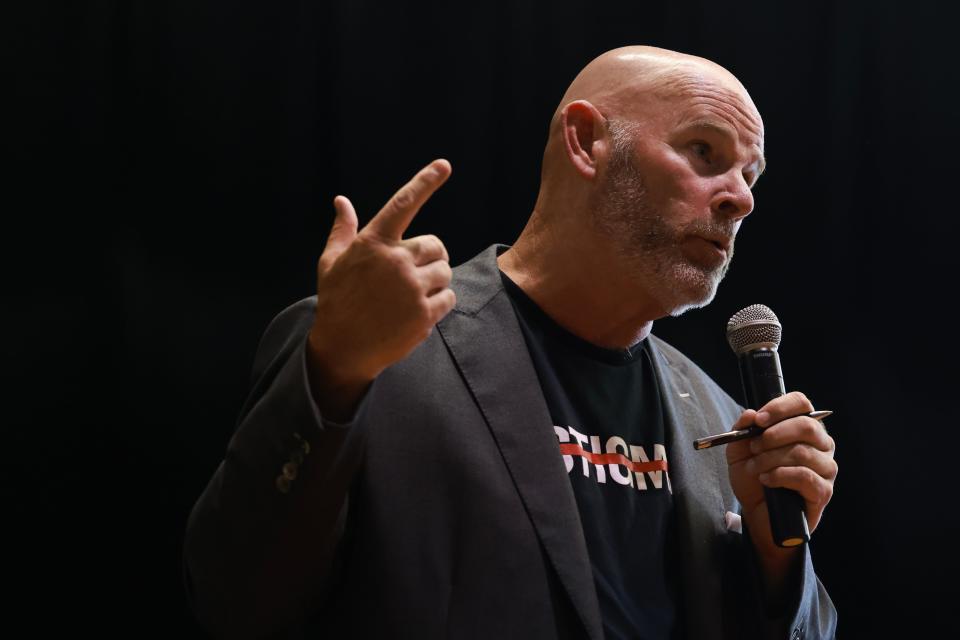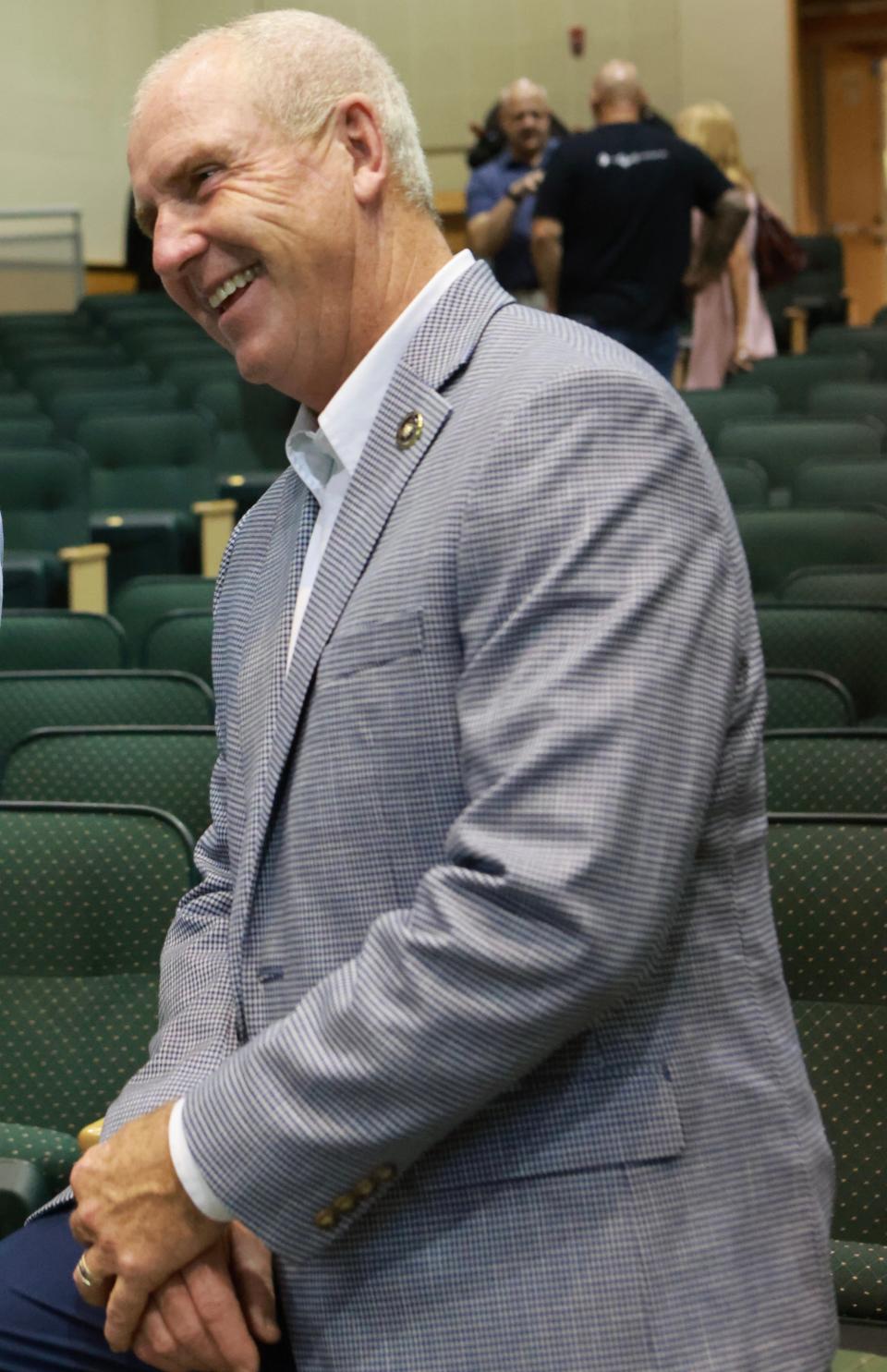'It's worth the fight.' Mental health struggles of first responders highlighted at D-Y
Michelle Fayed, a firefighter and paramedic from Florida, held the hands of a man whose legs were about to be amputated after he was trapped under concrete following a building collapse.
As she listened to him tell his wife how much he loved her before going under for amputation, Fayed watched as this latest traumatic moment on the job passed by. Another moment that would scar her for the rest of her life.
Afterwards, Fayed went home and had a birthday party for her daughter. The day went on.
Fayed's story was one of several told to an audience at Dennis-Yarmouth Regional High School Thursday night in South Yarmouth, during a screening of the documentary "Lift the Mask: First Responders Sound the Alarm."

While the general public, even the loved ones of first responders, see incidents like this as traumatic, unable to wrap their heads around responding to a call like that, first responders themselves, like Fayed, rarely have time to process the events they witness on a day-to-day basis.
In doing a job so vital, yet traumatic, first responders often buck up and push their experiences aside to keep on. This lack of regard for mental health is what "Lift the Mask: First Responders Sound the Alarm" aims to combat.
The documentary was created by the Quell Foundation for first responders and dispatchers as a tool to start the conversation about the impacts their jobs have on their mental health. It features first responders from all creeds, like police officers and firefighters, opening up about the trauma they experienced on the job and in their personal lives and the steps they took to get help.
"The goal here is just to normalize the conversation, reduce the stigma, that institutional bias against reaching out for help," Kevin Lynch, founder of the Quell Foundation said in an interview with the Times. "I think we're getting there. There's a changing of the guard, if you will, that we're starting to recognize that this is certainly something that we should put at the very forefront of initiatives across the country."
First responders documentary includes traumatic death of Yarmouth police Sgt. Sean Gannon
Filmed a year and a half after the 2018 shooting death of Yarmouth police Sgt. Sean Gannon, the documentary highlights the experience of Chris Van Ness, the Yarmouth police detective who found Gannon after he had been shot. During a panel talk after the screening, Van Ness highlighted how important it is for support systems to check in long after the first week or two of a traumatic event.
"When you go through a critical incident, everyone and their brother wants to reach out to you," he said. "But (in) a month ... that's when those phone calls slow down."
Van Ness suggested anyone who knows someone who has been through a trauma to set reminders to check in with that person months later.
"Put it in your iPhone .... in your calendar, three months after the fact, six months after the fact," he said. "It might seem so insignificant to you but to the person receiving that call it's invaluable."
For former Yarmouth Police Chief Frank Frederickson, departments could be doing more to help their employees cope with the experiences they have on the job.
Mental health checkups needed
"I think annual mental health checkups, by providing an incentive for that just like you do for physical checkups, that's equally as important," he said in an interview with the Times. "That has to be instituted. I think consistent policy that's current and constantly reviewed and made current with the new findings and new ways of handling these types of issues, that's important. I think working regionally, combining assets to help everybody out."

As for loved ones, particularly spouses of first responders, Molly O'Neil, wife of State Trooper Chris O'Neil, who died by suicide in 2016, said it's critical to get help for your spouse when you think they may be suffering.
"My biggest advice would be, don't be afraid of overreacting, and getting the help your spouseor partner needs," she said during the panel discussion. "It's worth the fight. Worst thing that can happen is probably a couple of days without talking, but it's better than a lifetime. If you feel in your gut that something's wrong, act."
Quell Foundation offers financial support for those who may not be able to cover the cost of mental health services through their Survive First program. For those interested in hosting a screening of "Lift The Mask: First Responders Sound the Alarm" visit the Quell Foundation website at https://thequellfoundation.org/
"We want to get to a point where it's not costing your life to protect ours," Lynch said.
If you need help
If someone you know is in need of help call or text the suicide prevention hotline at 988.
The National Suicide Prevention Lifeline is a hotline for individuals in crisis or for those looking to help someone else. To speak with a certified listener, call 1-800-273-8255.
Crisis Text Line is a texting service for emotional crisis support. To speak with a trained listener, text HELLO to 741741. It is free, available 24/7, and confidential.
If you or someone you know is in crisis, you can also call the Bay Cove Crisis Hotline at 1-833-229-2683. For more information about suicide prevention and how you can help, visit https://www.suicideispreventable.net/.
Thanks to our subscribers, who help make this coverage possible. If you are not a subscriber, please consider supporting quality local journalism with a Cape Cod Times subscription. Here are our subscription plans.
This article originally appeared on Cape Cod Times: Yarmouth police reliving tragic officer death part of new documentary

